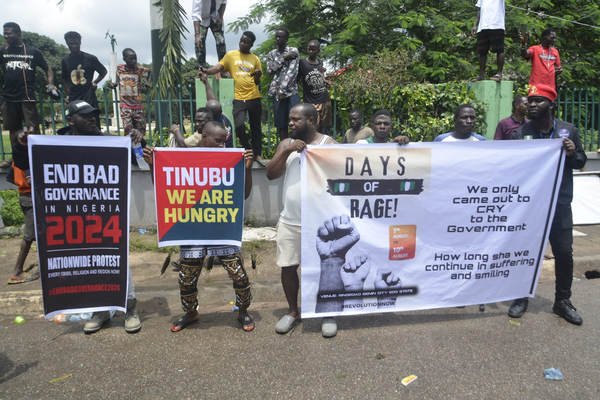- Details
- Headlines
Nigerian Cities Witness Unrest Amid High Inflation and Currency Devaluation
On Thursday, Nigerian police deployed tear gas to disperse hundreds of protesters rallying against the escalating cost of living in the northern city of Kano and the capital, Abuja, as reported by AFP correspondents on the ground.

Nigeria, Africa's most populous nation, is grappling with high inflation and a sharply devalued naira following President Bola Ahmed Tinubu's decision to end a costly fuel subsidy and liberalize the currency a year ago in a bid to stabilize the economy.
In Kano, the nation's second-largest city, protesters attempted to ignite bonfires outside the state governor's office, prompting police to respond with tear gas and force most demonstrators to retreat. Similarly, security forces in Abuja deployed tear gas to scatter crowds in Mararaba on the city's outskirts and in the city center.
The protest movement, rallying under the hashtag #EndbadGovernanceinNigeria, has gained significant traction through an online campaign. However, authorities have cautioned against emulating recent violent protests in Kenya, which led the government there to rescind new taxes.
The "End Bad Governance in Nigeria" movement is rapidly spreading across the country, with citizens in Benin City joining the wave of peaceful protests. Demonstrators on Airport Road voiced their demands for an end to ongoing governance issues. The peaceful protests brought together a diverse group of citizens, united in their calls for improved governance and greater accountability from their leaders.
As the movement gains momentum, the scene in Benin City underscores a growing national demand for transparency and better leadership. The unity and resolve of the protesters mark a significant moment in Nigeria's political landscape, as citizens from all walks of life advocate for meaningful change.
In a notable show of solidarity, Shehu Atiku Abubakar, son of former Vice President Atiku Abubakar, joined the #EndBadGovernance protest in Ojota, Lagos. This highlights the widespread discontent with current governance.
Meanwhile, President Bola Tinubu has labeled the protest organizers as "sinister" and cautioned against the rising unrest, which echoes recent anti-government demonstrations in Kenya and anti-corruption protests in Uganda. All three countries are facing economic difficulties and allegations of government misconduct, reflecting a broader trend of civil unrest in the region.
Senate President Godswill Akpabio sparked controversy by mocking protesters over Nigeria's economic challenges, stating that while they protest, he and others will be “eating.” This statement, made at a Niger Delta Development Commission event, was met with widespread criticism and highlighted the disconnect between the government and the people's struggles.
Amidst the growing protests, reports emerged of a paid anti-protest participant receiving only 2,000 Naira of the promised 5,000 Naira, causing further outrage online. Critics argue that this incident exposes the desperation and manipulation behind some protests, as people grapple with severe economic hardships.
The nationwide protests against economic hardship and governance issues reflect the mounting frustration among Nigerians and the urgent need for reforms to address the country's deep-rooted challenges.
- Details
- News Team
- Hits: 1301
Local News
- Details
- Society

Kribi II: Man Caught Allegedly Abusing Child
- News Team
- 14.Sep.2025
- Details
- Society

Back to School 2025/2026 – Spotlight on Bamenda & Nkambe
- News Team
- 08.Sep.2025
- Details
- Society

Cameroon 2025: From Kamto to Biya: Longue Longue’s political flip shocks supporters
- News Team
- 08.Sep.2025
- Details
- Society

Meiganga bus crash spotlights Cameroon’s road safety crisis
- News Team
- 05.Sep.2025
EditorialView all
- Details
- Editorial

Robert Bourgi Turns on Paul Biya, Declares Him a Political Corpse
- News Team
- 10.Oct.2025
- Details
- Editorial

Heat in Maroua: What Biya’s Return Really Signals
- News Team
- 08.Oct.2025
- Details
- Editorial

Issa Tchiroma: Charles Mambo’s “Change Candidate” for Cameroon
- News Team
- 11.Sep.2025
- Details
- Editorial





